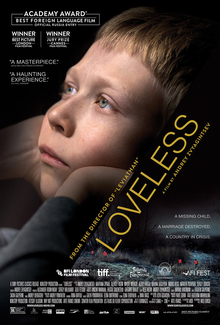
We’ve previously watched director Andrey Zvyagintsev’s Leviathan and loved it so getting recommendations for this one from friends and The Economist wasn’t really necessary. Though internationally successful, Leviathan made the director unpopular with the Russian government especially since he had accepted government money to make it. Loveless seems to have been mostly made with foreign funds but at least its production wasn’t banned.
Zhenya and Boris are in the middle of an acrimonious divorce which involves selling off their apartment. They are middle-class and reasonably well off but neither are interested in getting custody of their 12-year-old son Alyosha. Both are already romantically involved with new partners and are eager to move on from their failed marriage. Unbeknownst to them, Alyosha has heard their arguments and one day decides to run away from home. The two parents don’t notice that he is gone until the school calls to tell them that he has been absent for two days. When they report it to the police, the officer frankly tells them they don’t have the manpower to do anything about it and that the boy will probably come back by himself. He does refer them to a volunteer group that specializes in searching for missing persons. The group turns out to be highly professional and motivated, the unpaid volunteers seeming to put more energy and effort into the widening search than the parents themselves.
Moments upon starting this film, I remarked to my wife how is it that great directors shoot such amazing visuals even when the scenes are seemingly ordinary ones. The film opens with Alyosha walking home from school and the bleak, wintry landscape sets the somber mood. The cinematography and composition are exquisite. You can see the ice clinging on the bare branches as they reach out towards the sky and I’d bet like so many other directors, he is invoking Tarkovsky when the search moves on to abandoned buildings with their crumbled masonry and dirty water pooling in corridors. Also part of the visual appeal here is the camera’s casual willingness to go up and close and personal to naked human bodies. Zhenya and Boris hate each other so much that they can’t stand to be in one another’s presence but their respective passion for their new loves is viscerally physical and that too is a point that the film is trying to make.
Thematically Loveless gives the initial impression that it is weaker than Leviathan. A child who runs away from home due to parental neglect but hardly anything new and the film resolutely refuses to zero in on any particular character. In fact, we barely see much of Alyosha himself. It makes more sense to think of it as a general indictment against the moral rot that pervades every layer of Russian society. We can see this in the indifference of the police and the way Zhenya’s mother excoriates her when they go looking for her in the hopes that Alyosha may have sought refuge there. Indeed the first thing that the police do is to verify that the parents have not murdered their own child. Zhenya and Boris are passionately in love with their new partners but the film also makes it clear that this doesn’t last and it doesn’t change who they fundamentally are. It’s a thoroughly depressing view of human society.
Still it’s frustrating that the film doesn’t appear to offer an explanation of why this is so or whether it is a phenomenon that is unique to Russia. The news reports of the conflict in eastern Ukraine that plays in the background of many scenes suggests that the rot perhaps starts from the very top levels of government. Another possibility is the use of mobile phones as a visual motif. Anytime the characters aren’t engaged in something else, they can be seen looking at their phones. Overall I find that while this doesn’t quite pack as strong an emotional punch as the previous film, it is after all quite difficult to make an emotional film about characters with an emotional void within themselves, this is no less rich and interesting. Certainly Zvyagintsev is confirmed as one of the great Russian directors of the day.